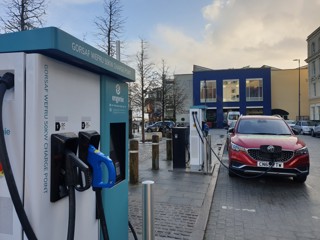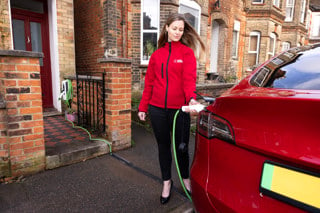Cardiff Council is considering introducing a congestion charge to improve air quality in the Welsh capital.
It is part of plan which would include an expanded bus service with cheaper £1 fares, a new tram network and enhanced regional links.
No details of how much vehicles would be charged or where the charging zone would be implemented have been released at this stage.
If given the go-ahead, the scheme could take up to five years to implement..
Cardiff Council’s cabinet will consider a report into the proposal on Thursday, April 27.
Cardiff Council leader, Cllr Huw Thomas, said: “Cardiff needs and deserves a cleaner and a greener transport system. However, funding this will likely only be possible by the introduction of some form of low-cost road user payment which would have exemptions for those least able to pay.
“Before any such scheme was introduced, we will clearly have to make improvements to the current transport system so people have options to reduce their reliance on the car.
“We would need better, enhanced, and cheaper bus routes, alongside improvements to regional commuting options, and visible signs of a new tram network in the city.”
He added: “I understand that there will be those who say that ‘this is just another tax when the country is facing a cost-of-living crisis?' So let me address that head on.
“The current levels of traffic in Cardiff are costing the average resident hundreds upon hundreds of pounds each year and holding our economy back. That's on top of the environmental and health damage caused by congestion.
“So, it's imperative that we create a transport system where everyone - in particular our poorest and most disadvantaged communities - can be better connected with the jobs and opportunities we know are available in the city.”
Currently, road transport is responsible for 40% of carbon emissions in Cardiff. This is the joint highest C02e figure measured for road transport among the UK's 11 core cities, which include Belfast, Birmingham, Bristol, Glasgow, Leeds, Liverpool, Manchester, Newcastle, Nottingham, and Sheffield.
The new report warns that, without the introduction of a ring-fenced road user payment, it is unlikely Cardiff will ever get the transport system it “desperately needs”.
If agreed by Cardiff Council's cabinet, the project would consider a range of road payment schemes including, but not limited to, road user payments, congestion zones, clean air zones (CAZs) and workplace parking charges.
It would also determine, in consultation with the public, on what a ‘fair and equitable' payment might look like.
The project work will also consider any local users that may need to be exempt, reimbursed, or who qualify for discounts.
It will seek to reduce impacts on the poorest residents, and on regular users in the city and region. An example of this is London, where residents qualify for a 90% discount on the congestion charge if they live within the ULEZ zone.
Cllr Thomas said: "There are so many potential benefits at play here. Reducing carbon emissions will naturally help us tackle air pollution and climate change, but that's not all.
“We also believe that a payment could help reduce congestion. The cost of congestion to the economy in Cardiff was estimated by Inrix to be £109 million in 2019.
“If we can reduce congestion, we can improve everyone's ability to get where they need to be in the city more quickly. This can open-up job opportunities for people and labour markets for employers, delivering a positive economic impact across the city.”
He added: “We want residents and businesses to help us build the future which works best for Cardiff.
“As such, there will be a series of consultations and we will set up stakeholder groups and a residents' panel to ensure that everyone's voice and views are heard.”
Cardiff Council will consider the report at 2pm on Thursday, April 27.























Login to comment
Comments
No comments have been made yet.